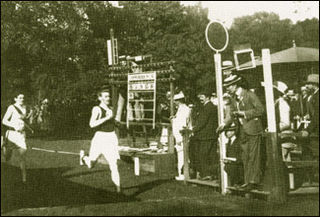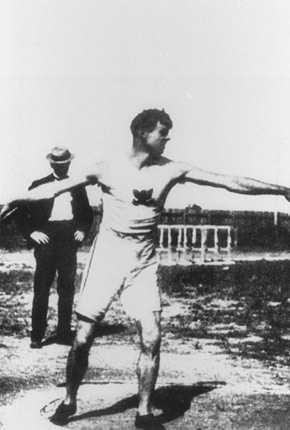
At the 1904 Summer Olympics, twenty-five athletics events were contested. A total of 74 medals were awarded.

James Davies Lightbody was an American middle distance runner, winner of six Olympic medals in the early 20th century.
The men's 800 metres made its fourth Olympic appearance at the 1908 Summer Olympics. The competition was held on July 20, 1908, and on July 21, 1908. The races were held on a track of 536.45 metres=1⁄3 mile in circumference. It was run in two rounds, with the winners of the eight heats of the first round competing in the final.
The men's 1500 metres was an Olympic event for the fourth time at the 1908 Summer Olympics. The competition was held on 13 and 14 July 1908. The races were held on a track of 536.45 metres=1⁄3 mile in circumference. The event was won by Mel Sheppard of the United States, the second consecutive Games an American had won the event. Sheppard, like Jim Lightbody in 1904, would also win the 800 metres for a middle-distance double.

The men's 800 metres was middle-distance running event on the athletics programme at the 1900 Summer Olympics in Paris. It was held on July 14 and July 16, 1900. The races were held on a track of 500 metres in circumference. 18 athletes from seven nations competed. The event was won by Alfred Tysoe of Great Britain, the nation's first medal in the event. The United States also won its first medals in the 800 metres, with silver and bronze.

The men's 2500 metres steeplechase was a track & field athletics event at the 1900 Summer Olympics in Paris. It was the first time that a steeplechase race was held at the Olympics. The race was held on July 15, 1900, on a 500-metre track. Six athletes from six nations competed in the shorter of the two steeplechase events. The 4000 metre steeplechase race was held one day later. The event was won by George Orton of Canada, the nation's first gold medal in athletics. Sidney Robinson of Great Britain took silver, while Jean Chastanié of France earned bronze.

The men's 200 metres was a track and field athletics event held as part of the Athletics at the 1912 Summer Olympics programme. It was the fourth appearance of the event, which has appeared at every edition of the Summer Olympics since the 1900 Summer Olympics. The competition was held on July 10, 1912, and on July 11, 1912. 61 runners from 19 nations competed. NOCs could enter up to 12 athletes. The event was won by Ralph Craig of the United States, the nation's third victory in four Games. Another American, Donald Lippincott, took silver. Great Britain earned its first medal in the 200 metres with Willie Applegarth's bronze.

The men's 800 metres was a track and field athletics event held as part of the athletics at the 1912 Summer Olympics programme. It was the fifth appearance of the event, which is one of 12 athletics events to have been held at every Summer Olympics. The competition was held from Saturday, July 6, 1912, to Monday, July 8, 1912. Forty-seven runners from 16 nations competed. NOCs could enter up to 12 athletes. The event was won by Ted Meredith of the United States, the nation's third consecutive victory in the 800 metres. Mel Sheppard became the first man to win two medals in the event, coming in second to miss out on defending his 1908 gold. Ira Davenport completed the United States sweep, the second time the Americans had swept the 800 metres podium.

William Franklyn "Bill" Verner was an American athlete and middle-distance runner who competed in the early twentieth century.

The men's 60 metres was a track and field athletics event held as part of the Athletics at the 1904 Summer Olympics programme. It was the second and last time the event was held at the Olympics. 12 athletes from 3 nations participated. The competition was held on August 29, 1904. The event was won by Archie Hahn of the United States, with William Hogenson second and Clyde Blair third as the host nation swept the medals. It was the first of three gold medals in the sprints won by Hahn in 1904.

The men's 200 metres was a track and field athletics event held as part of the Athletics at the 1904 Summer Olympics programme. It was the second time the 200 metres was contested. All races of this competition was held on a straight course. 5 athletes from 3 nations participated. The competition was held on August 31, 1904. The United States swept the medals, with Archie Hahn earning the second of his three sprint medals in St. Louis. Nathaniel Cartmell took silver and William Hogenson earned bronze. It was the second consecutive American victory in the event.

The men's 800 metres was a track and field athletics event held as part of the Athletics at the 1904 Summer Olympics programme. It was the third time the event was held. 13 runners from 3 nations participated. The competition was held on September 1, 1904. The event was won by Jim Lightbody of the United States, the nation's first title in the 800 metres. The United States, with 10 of the 13 runners, swept the medals—the first sweep of the 800 metres podium.

The men's 110 metres hurdles was a track and field athletics event held as part of the Athletics at the 1904 Summer Olympics programme. It was the third time the event was held. 6 hurdlers from 2 nations participated. The competition was held on September 3, 1904. The event was won by Frederick Schule of the United States, the third of five consecutive victories for the nation in the first five Olympic Games. It was also the second of four consecutive podium sweeps for the Americans in the event.

The men's 200 metres hurdles was a track and field athletics event held as part of the Athletics at the 1904 Summer Olympics programme. It was the second, and final, time the event was held. Five athletes from the United States participated. The competition was held on September 1, 1904. The event was won by Harry Hillman; Frank Castleman took silver and George Poage bronze.

The men's 2590 metres steeplechase was a track and field athletics event held as part of the Athletics at the 1904 Summer Olympics programme. It was the only time the event was held at the 2590 metre distance, though the 1900 Summer Olympics had featured a similar event in the 2500 metre steeplechase. The competition was held on August 29, 1904. 7 athletes from 2 nations competed. Jim Lightbody of the United States won the first of his three gold and four overall medals in the 1904 Games. Irishman John Daly took silver, with Lightbody's countryman Arthur L. Newton earning bronze.

The men's 4 miles team race was a track and field athletics event held as part of the Athletics at the 1904 Summer Olympics programme. It was the first time the event was held, though the 1900 Summer Olympics had featured a similar event in the 5000 metre team race. Two teams of five athletes each competed. The competition was held on September 3, 1904. The event was won by the New York AC team, with Arthur L. Newton finishing first individually; Chicago AA had the next three finishers, but Chicago also had the last two runners. New York won by 1 point.

The men's long jump was a track and field athletics event held as part of the athletics at the 1904 Summer Olympics programme. It was the third time the event was held. Nine athletes from three nations participated. The competition was held on Thursday, September 1, 1904.

The men's discus throw was a track and field athletics event held as part of the Athletics at the 1904 Summer Olympics programme. It was the third time the event was held. The competition was held on Saturday, September 3, 1904. Six athletes from two nations competed.

The 800 metres at the Summer Olympics has been contested since the first edition of the multi-sport event. The men's 800 m has been present on the Olympic athletics programme since 1896. The women's event was first held in 1928, making it the first distance running event for women. The women's race was not held again until 1960; it has been a permanent fixture since. It is the most prestigious 800 m race at elite level. The competition format typically has three rounds: a qualifying round, semi-final stage, and a final between eight runners.

The steeplechase at the Summer Olympics has been held over several distances and is the longest track event with obstacles held at the multi-sport event. The men's 3000 metres steeplechase has been present on the Olympic athletics programme since 1920. The women's event is the most recent addition to the programme, having been added at the 2008 Olympics. It is the most prestigious steeplechase track race at elite level.

















